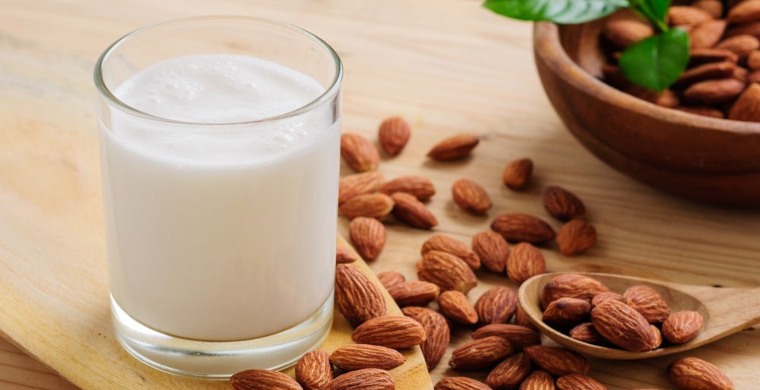No particular food or drink can guarantee a good night’s sleep! However, some of them may potentially improve your sleep by providing your body with sleep-promoting compounds, such as melatonin.
One of the beverages that may help you sleep better is almond milk, which is made from whole almonds.
Almond milk contains a decent amount of magnesium and is said to be rich in both melatonin and tryptophan. According to science, these nutritional components can contribute to sleep in different ways.
In this article, we’ll find out how almond milk may influence your sleep.
Diet and Sleep
Symptoms of insomnia affect up to 70 million Americans every year. And, the rest of the world is no different. In short, sleep problems are common across the globe.
People use different strategies to improve the quality and quantity of their sleep. One strategy people have been using for centuries is to consume certain foods and drinks before going to bed.
Although there is no magical food that can resolve all sleep problems in all affected individuals, science suggests that certain foods and drinks may positively influence the quality and quantity of sleep.
Almond Milk and Sleep
Almonds are considered to be good for sleep because they contain certain sleep-promoting compounds. Plus, in some studies, almonds have been shown to promote good sleep. Since almond milk is made from whole almonds, almond milk is also associated with better sleep.
It is worth noting that when processing whole almonds to make almond milk, some nutrients that are naturally present in almonds remain in the pulp, meaning they don’t pass into almond milk! In other words, certain nutrients in almonds aren’t found in almond milk or are found in very small amounts (unless the milk is fortified). These nutrients include fibre, calcium, protein and a large portion of almonds’ antioxidants.
The good news, however, is that sleep-promoting compounds found in almonds, such as tryptophan, melatonin and magnesium are also found in almond milk.
Sleep-promoting Nutrients in Almond Milk
The presence of melatonin, tryptophan and magnesium in almond milk is the main reason why almond milk may help with better sleep. So let’s briefly explain how these nutritional components may affect your sleep.
Melatonin and Sleep
Melatonin — often called the sleep hormone — is produced mainly by the pineal gland in the brain as a response to darkness.
According to the National Institutes of Health; melatonin helps with circadian rhythms (24-hour internal clock) and promotes sleep. As per the Cleveland Clinic: you sleep better when you have the highest levels of melatonin in your body.
Some foods contain melatonin naturally. Nuts, especially pistachios, almonds and walnuts are said to be high in dietary melatonin and therefore their consumption is linked to better sleep.
Because almond milk (made from whole almonds) contains melatonin, this popular plant-based milk may contribute to your sleep.
Tryptophan and Sleep
Tryptophan is an essential amino acid that plays several important roles in the body. The human body can’t produce this amino acid on its own, so it has to be taken in through diet.
As for tryptophan’s role in sleep: tryptophan is needed in the body to produce serotonin. With the help of other enzymes, serotonin creates melatonin.
Studies found that increasing tryptophan intake in the diet may promote good sleep because tryptophan helps increase the concentration of melatonin in the blood.
While tryptophan is found in a variety of foods, some foods are particularly high in this essential amino acid. Nuts, including almonds, are a good source of tryptophan.
Almond milk contains the amino acid tryptophan, therefore, may improve sleep.
Magnesium and Sleep
In two ways magnesium may help with sleep:
- It helps reduce inflammation.
- It helps reduce the stress hormone (cortisol).
According to a study, an adequate intake of magnesium may help to improve sleep quality, especially in people with insomnia.
Almond milk is considered high in magnesium. According to the U.S. Department of Agriculture; 1 cup (244 g) of almond milk contains 14.6 mg of magnesium.
Related Studies
To our knowledge, almond milk has never been investigated for its effects on sleep. However, researchers have tested the sleep effects of almonds in some studies and concluded that almonds may help improve sleep.
In one study researchers fed rats with 400 mg of almond extract to evaluate the sedative and hypnotic effects of almonds. It was found that the rats slept longer and more deeply than they did without consuming the extract.
In another study, Iranian researchers aimed to see the potential effects of sweet almonds on the quality of sleep. Medical students living in dormitories were given 10 almonds for 2 weeks. The result: almonds helped reduce insomnia symptoms in many students with insomnia.
When available scientific research (although not enough to draw a certain conclusion) and nutrition profiles are taken into account, it appears that almonds and almond milk may be conducive to sleep.
Homemade vs Store-bought: Which Type of Almond Milk is Better for Sleep?
Generally speaking, more almonds are used when making homemade almond milk. This means that the concentration of sleep-inducing hormones — such as melatonin and tryptophan — is possibly higher in homemade almond milk than in store-bought almond milk. Besides, homemade almond milk doesn’t contain additives like carrageenan, which is found in some almond milk brands. Therefore, homemade almond milk appears to be a better option for sleep.
However, if purchasing is your only option, then opt for an almond milk brand that is fortified with vitamin D and calcium. Because these nutrients are known to help sleep.
Vitamin D is involved in the production of melatonin. Similarly, calcium is known to help the brain use tryptophan, the amino acid that the body uses to produce melatonin.
Note: Opt for unsweetened almond milk as added sugar can disrupt your sleep.
How Much Almond Milk For Sleep?
Since the effects of almond milk on sleep haven’t been tested in scientific studies, it is hard to recommend any amount of almond milk for sleep. Though, one thing is certain: Drinking too much of any kind before sleep can cause you to wake up several times to urinate, which can disrupt your sleep. So try not to drink more than one cup of almond milk before going to bed.
The Bottom Line
Scientific studies investigating foods’ effects on sleep tend to produce different results because many factors influence sleep and people respond differently to the same food.
According to science; both diet and sleep are complex and no particular foods can work wonders when it comes to sleep. That said, science does not rule out the possibility that certain foods and drinks may aid sleep by providing the body with certain nutrients. In this article, we discussed one of them: almond milk.
Tryptophan and melatonin-containing almond milk may help improve your sleep.
To see whether almond milk affects your sleep, consider drinking it each night an hour before sleep for two weeks and keep a sleep diary.
Other Potential Benefits of Almond Milk:
- Excellent source of vitamin E
- Lactose-free
- May promote healthy skin
- Supports a healthy heart
- Suitable for a vegan diet




